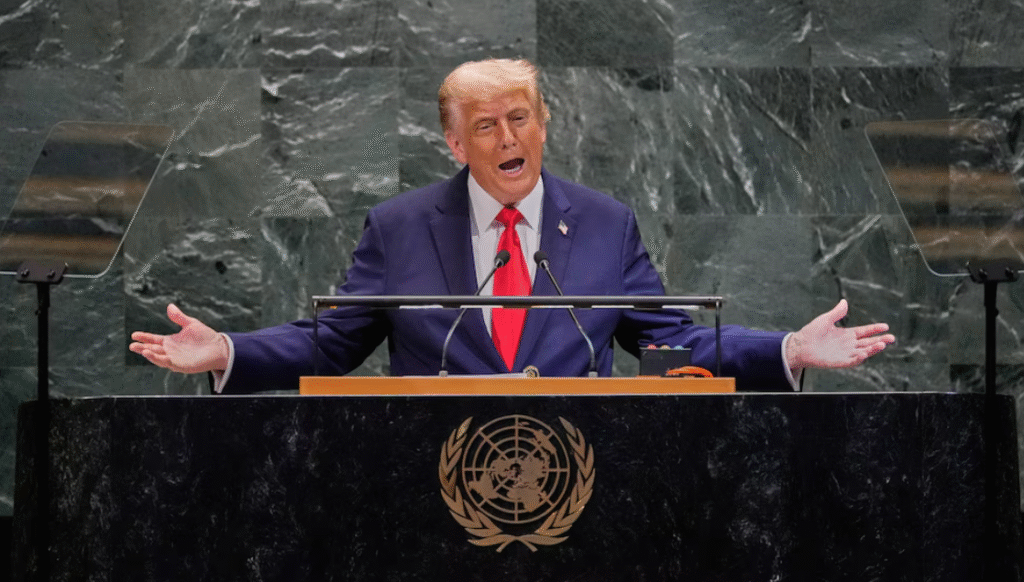It can be said to be a day of reckoning at the United Nations (UN) as the President of the United States, Donald Trump presented a Confrontational Address to World Leaders.
On September 23, 2025, President Donald Trump addressed the 80th session of the United Nations General Assembly. The speech was widely anticipated, in part because of Trump’s past skepticism toward multilateral institutions and his “America First” posture. In a tone that combined fiery rhetoric, provocative claims, and confrontational framing, Trump used the UN platform to challenge prevailing international norms, rebuke allies, and reassert a vision of national sovereignty over global cooperation.

Image Credit: ABC News
Highlights & Key Claims
Trump spoke on different issues during his speech. Below are some of the major themes and claims he advanced, along with how they were received in the public/media sphere:
| Major Theme | Key Claims / Messages | Notes & Media Reaction |
|---|---|---|
| Sovereignty vs. Globalism | He framed globalism as a destructive force, arguing that nations should prioritize their citizens, borders, and identity. | This is consistent with his long-standing “America First” posture. Some saw it as a fundamental rejection of what the UN was built for. |
| Immigration & Borders | Trump accused many countries — particularly in Europe — of being “invaded” by illegal immigrants, warning that open borders were “destroying” nations. He urged nations to close borders and expel foreigners. | His language was inflammatory and drew criticism for oversimplifying migration and painting with broad generalizations. |
| Climate & Energy Policy | He dismissed climate change as “the greatest con job ever perpetrated on the world.” He attacked green energy policies, particularly in Europe, warning they would undermine economies. | This echoes his skepticism toward global climate initiatives and treaties. |
| War, Peace & UN Effectiveness | Trump claimed he had “ended seven unendable wars,” lamented that the UN didn’t support or help in these efforts, and questioned the effectiveness of “strongly worded letters” by the UN. | Many in the media fact-checked his war-ending claims, pointing out discrepancies or lack of evidence. |
| Technical Gaffes as Symbolism | Early in the speech he complained about a malfunctioning teleprompter. He also referenced a stalled escalator earlier in his visit. | The UN later responded by saying the escalator issue was due to a safety mechanism, and that the teleprompter was being operated by the White House. |
| Criticism of Allies & Russia / Ukraine War | He criticized European nations for still buying Russian energy, calling it hypocritical, and warned of tariffs if Russia didn’t make a deal. He supported Ukraine’s right to reclaim territory. | This put pressure on traditional US allies and underscored his transactional view of alliances. |
| Closing Call & Tone | He ended by urging countries to “defend free speech,” warned that America belongs to Americans, and encouraged sovereign states to stand firm. | The tone combined grandiose claims, moral framing, and populist exhortation. |
Critiques, Controversies & Pushback
While provocative, the speech did not come without considerable skepticism and backlash:
Factual Disputes: Many of Trump’s assertions—such as ending seven wars, or his portrayal of immigration flows—were challenged by fact-checkers and analysts as exaggerations or omissions.
Tone & Diplomacy: His blunt admonishments (“your countries are going to hell”) drew criticism for being undiplomatic and straining relations with allies.
UN Reaction & Defense: The UN, including Secretary-General António Guterres, defended its role. There was internal pushback over Trump’s framing of the UN as ineffective.
Technical Issues & Sabotage Claims: Trump implied possible sabotage regarding the escalator and teleprompter malfunctions. The UN denied sabotage, attributing the escalator stoppage to a triggered safety mechanism.
Softening Gesture: Interestingly, despite the harsh tone during the speech, Trump later told Guterres in a bilateral setting that the U.S. supports the UN and its peace potential.
Global Order & Norms: Some commentators lamented that the address marked a low point in U.S.–UN relations, perhaps signaling a deeper rift between nationalist and multilateralist visions.
Implications & What to Watch
Trump’s speech at the UN is more than rhetorical posturing; it could have real consequences for how the U.S. engages with international bodies and how other nations respond. Here are some possible implications and developments to look out for:
Shift in U.S. Diplomacy
The speech reinforces a tilt toward unilateralism over multilateralism. Future U.S. engagements with the UN, treaties, and global initiatives might see reduced cooperation or more conditions attached.
Strain with Allies
Allies in Europe and other regions may feel targeted, especially on immigration and energy policy. Some may push back or seek alternatives to deepen cooperation among themselves.
UN Funding & Reform
The criticisms could justify domestic pressure to cut or withhold U.S. contributions to the UN or push for reforms to make it more accountable, efficient, or aligned with U.S. interests.
Climate & Environmental Policy Clash
The rejection of climate science and green energy models will further pit the U.S. against countries committed to aggressive emissions cuts and renewable transitions.
Migration & Border Policy Exportation
Some nations may adopt or cite Trump’s framing to justify stricter migration policies at home, especially in regions dealing with migration pressure.
Reputational Risks
The blunt language and contested claims could erode U.S. credibility on the world stage, especially among countries that value rule-based diplomacy and consensus.
Domestic Political Use
Given that UN speeches are high-visibility, elements of the address are likely to be recycled into Trump’s domestic messaging and campaign narratives, reinforcing his base and argument about globalism vs nationalism.
Conclusion
President Trump’s 2025 UN speech was a bold, confrontational statement. It reasserted his long-standing skepticism toward international institutions and globalism, and sought to flip the script—portraying global cooperation frameworks as obstacles rather than opportunities. Whether the world or the UN will accommodate or resist his narrative is still to play out.
What do you think about President Trump’s UN speech? Share your thoughts in the comments—we’d love to hear your perspective.